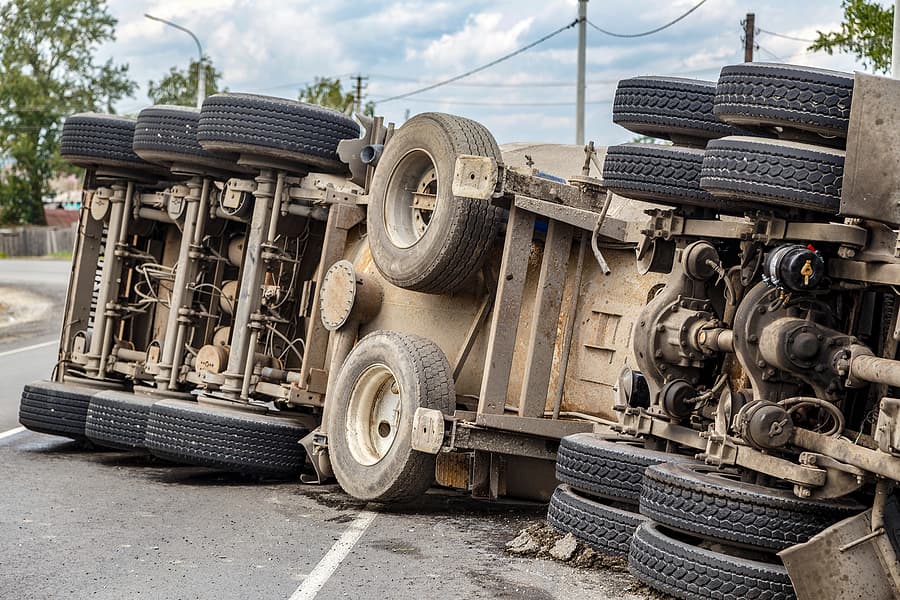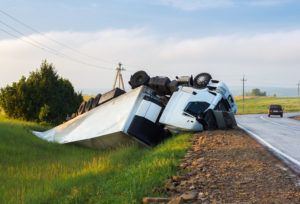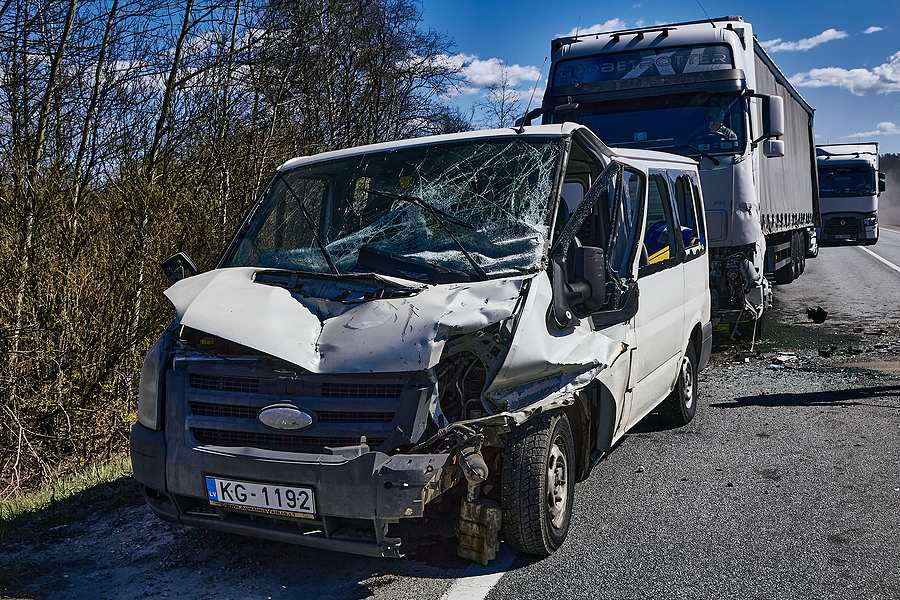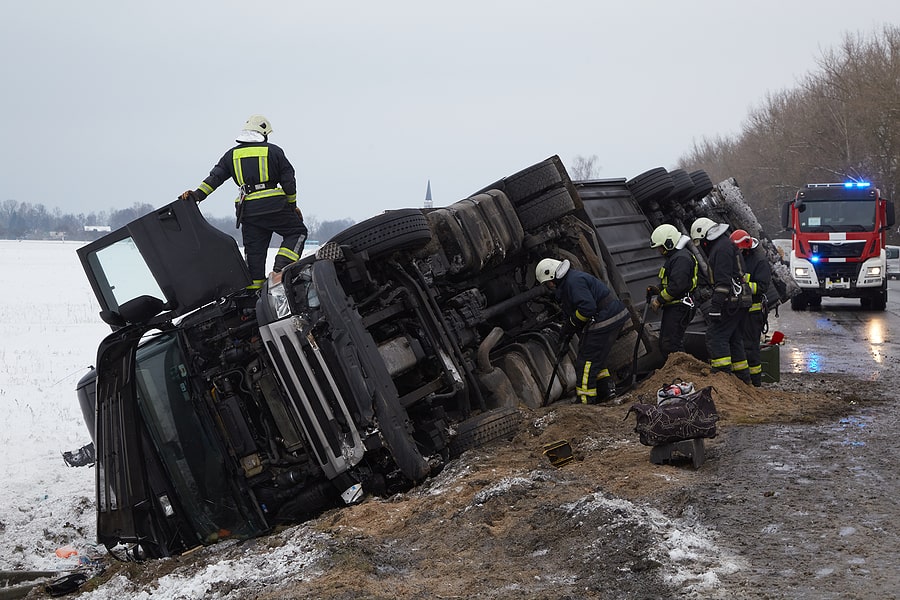Truck accidents can leave their victims seriously injured and needing extensive and prolonged medical treatment. When a truck accident results from another driver or someone else’s negligence, the accident victim can file a personal injury claim or a lawsuit in the court system to seek financial recovery for their injuries and losses.
No one will receive compensation automatically, however. You need to identify all liable parties and file the proper claims to begin seeking what you deserve. Determining to hold responsible for a truck crash can be complicated, and you need the right professional assistance.
If you suffered injuries in a truck accident that resulted from negligence, you should seek immediate medical treatment for your injuries. Your next step should be to contact an experienced truck accident lawyer in your state who can help you file a personal injury claim.
In addition to filing the claim on your behalf, your lawyer can explore your legal options, pursue settlement negotiations with the insurance company adjuster, and, if necessary, litigate your case to an efficient conclusion. Your lawyer will do everything that they can to safeguard your legal rights and ensure that you recover monetary compensation that is both fair and reasonable.
For a free legal consultation, call 631-451-7900
Common Causes of Truck Accidents—and Who is Responsible
 Truck accidents typically happen when drivers and the companies that employ them are negligent. Truck driver negligence can take multiple forms, including violating one or more traffic laws.
Truck accidents typically happen when drivers and the companies that employ them are negligent. Truck driver negligence can take multiple forms, including violating one or more traffic laws.
For example, the truck driver might speed, fail to yield the right-of-way at the appropriate time, tailgate another vehicle, engage in road rage, or fail to use a turn signal. Alternatively, the responsible truck driver might fail to follow one or more motor carrier regulations. These regulations are in place to help prevent accidents and encourage safe truck operations.
Trucking companies and truck drivers disregard regulations that govern overhead and undercarriage lighting, weight limits, and cargo-loading procedures. For example, when a truck driver or trucking company fails to properly secure cargo to a truck bed, the load can slide off the truck and into the roadway, causing a severe accident.
Truck accidents also occur when drivers fail to watch the road and operate their vehicles while intoxicated by drugs or alcohol. Finally, some truck accidents happen when drivers are fatigued.
In addition to filing a claim against the responsible truck driver, accident victims can file a claim against the employer trucking company. Trucking companies are sometimes responsible for their drivers’ negligent acts while on the job.
In addition, you can hold trucking companies responsible when they fail to obey state and federal motor carrier regulations—or when they hire/retain an inexperienced or unqualified driver. Finally, they may fail to supervise a driver and ensure that they maintain the necessary qualifications and certifications. A knowledgeable truck accident lawyer in your area can help you file a claim or lawsuit against the responsible truck driver or trucking company in your case.
In addition to truck drivers and trucking companies, repair facilities are sometimes responsible for truck accidents. These facilities must perform repair work safely and reliably. If they botch a repair procedure and the truck or trailer malfunctions on the road, they can be responsible for the accident and any injuries that result. In most instances, an accident victim’s lawyer must retain an expert to connect negligent repair work to a truck accident causally.
Finally, some truck accidents happen because of defective truck parts. Product manufacturers, including manufacturers of truck steering mechanisms, braking components, and load fasteners, have a duty to construct and design their products safely and carefully.
They must also test their products before selling them to trucking companies. When a product defect causes a truck or trailer to malfunction on the road, the accident victim can bring a claim against the responsible part manufacturer, distributor, or other entity in the chain of distribution.
A knowledgeable truck accident lawyer in your jurisdiction can meet with you to discuss how your accident occurred. Your lawyer can then file the appropriate claim or lawsuit against all potentially responsible parties and pursue all of the damages you deserve for your injuries.
Truck Accident Injuries
When a large truck, such as a tractor-trailer, big rig, or 18-wheeler, collides with a much smaller vehicle, it is almost always the smaller vehicle occupants who suffer more extensive injuries. The injuries a truck accident victim suffers will depend upon how their body moves in their vehicle at the time of impact. If the impact jerks the accident victim’s body abruptly forward and backward, they might suffer a soft tissue injury, such as a whiplash injury.
If their head strikes the steering wheel, headrest, window, or door- frame in the accident, they might suffer a traumatic head injury, such as a concussion. Finally, if their elbow, arm, leg, or knee strikes something in the vehicle, they may suffer a fracture, broken bone, or soft tissue injury.
Your most important step after a truck accident should be seeking medical treatment for your injuries. Therefore, you should follow up at a hospital emergency room or urgent care center—even if you are unsure about the extent of your injuries. Injury symptoms may not manifest until days or weeks after your accident. You want to ensure you receive the treatment you need to recover swiftly.
In a hospital emergency room, the medical provider can examine you, order the necessary imaging studies—including CAT scans, MRIs, and X-rays—and make recommendations for follow-up treatment. Failing to seek prompt medical treatment after your accident can also negatively impact your truck accident claim.
The insurance company adjuster may assume that your injuries are not severe or that you did not take your medical treatment seriously. When that happens, the adjuster may not offer you significant monetary compensation to resolve your personal injury claim.
While you focus on getting the treatment you need, your lawyer can begin handling the legal aspects of your case. Specifically, your lawyer can gather your lost wage documents, photographs, impact statement, and medical treatment records and assemble them into a demand package. After your medical treatment is complete, your lawyer can submit the settlement demand package and a demand letter to the insurance company adjuster for review. If the adjuster accepts fault for your accident, they can begin settlement negotiations with your lawyer.
Click to contact our personal injury lawyers today
Types of Truck Accidents
When truck drivers and others are negligent, serious accidents can occur. Some of the most common types of truck accidents include rear-end crashes, broadside collisions, jackknife accidents, sideswipe accidents, and head-on impacts.
A rear-end collision happens when the front of a truck strikes the back of another vehicle. These accidents are common at traffic intersections, where truck drivers are intoxicated or fail to pay attention to the road. They may not slow their vehicle down in time to avoid a crash, often catching the front vehicle driver entirely by surprise.
Broadside collisions, or T-bone accidents, happen when the front of a truck strikes the side of a vehicle moving in an adjacent direction. The truck driver might fail to pay attention when merging onto a highway, or they may run a red light or stop sign, colliding with a vehicle in the center of the intersection.
A truck jackknife accident occurs when the tractor and trailer fold inwards together, resembling the shape of a jackknife. These accidents often happen when truck drivers speed or take curves too sharply. When a truck jackknifes, it can skid downhill and strike one or more vehicles, causing a multi-vehicle pileup where numerous drivers and passengers suffer serious injuries.
Sideswipe accidents happen when the sides of two vehicles brush up against one another. When the side of a large truck strikes the side of another vehicle, the impact might force the smaller vehicle into another travel lane or off the road, causing severe injuries.
Finally, a head-on collision happens when the front of a truck and another vehicle strike one another. These accidents typically occur on dual-lane highways, with one travel lane proceeding in each direction. These accidents also happen when truck drivers fail to watch the road and negligently cause their vehicles to cross the median strip or center line—into oncoming traffic. When a head-on crash occurs at a high rate of speed, severe injuries and fatalities can result.
You have legal options if you or someone you love has suffered injuries in a negligence-related truck accident. A knowledgeable truck accident lawyer in your area can meet with you to discuss your accident and evaluate your claim’s potential strengths and weaknesses. If you are eligible to file a personal injury claim for damages, we can do so on your behalf and pursue fair settlement compensation for you.
Complete a Free Case Evaluation form now
Potential Monetary Damages in Truck Accident Cases
Injured truck accident victims can pursue various damages for their injuries. The total damages an accident victim recovers will depend on their injuries—and whether or not those injuries are permanent. Moreover, insurance companies, juries, and arbitrators will consider whether the accident victim lost income or suffered a permanent injury in their accident.
All truck accident claims are different, and some accident victims recover more monetary damages than others. Generally speaking, the more extensive an accident victim’s injuries, the higher the damages they will recover in their truck accident claim or lawsuit.
First, truck accident victims can pursue compensation for lost wages if they had to miss time from work following their accident. Some accident victims suffer such severe injuries that they have to switch jobs or entire careers. When that happens, they may be eligible to file a claim for loss of earning capacity.
In addition, accident victims can recover compensation for losing the ability to use a body part, such as if they suffered a permanent paralysis injury. They can also seek compensation for loss of life enjoyment if their activity levels decrease significantly after their accident. Finally, they can pursue monetary damages for their inconvenience, emotional distress, permanent disability, pain and suffering, and loss of spousal companionship and consortium.
To prove that you suffered a permanent injury in your accident, your lawyer may need to retain an expert medical provider to testify for you at a deposition or trial. The provider must be willing to state in writing, and to a reasonable degree of medical certainty, that your injury or injuries are permanent.
A permanent injury is unlikely to improve over time—or with additional medical treatment. If you suffered permanent damage in your truck accident, you might recover compensation for your past and future pain and suffering through your injury claim.
An experienced truck accident lawyer in your area can review your accident circumstances with you and determine which of these items of damage you might be eligible to recover in your case. Your lawyer can then pursue those damages through settlement or litigation.
Speak With an Experienced Truck Accident Lawyer Near You Today

When accident victims file their personal injury lawsuit belatedly, they are no longer eligible to recover damages. Therefore, you should talk with an experienced lawyer as soon as possible after your accident.
In addition to investigating your accident circumstances, your lawyer can promptly file a claim or lawsuit on your behalf, negotiate with the insurance company, and pursue all the damages you deserve.
If the insurance company disputes fault in your case—or refuses to offer you the damages you need for your injuries—your lawyer can file a lawsuit and zealously advocate for you at a jury trial or binding arbitration proceeding.








